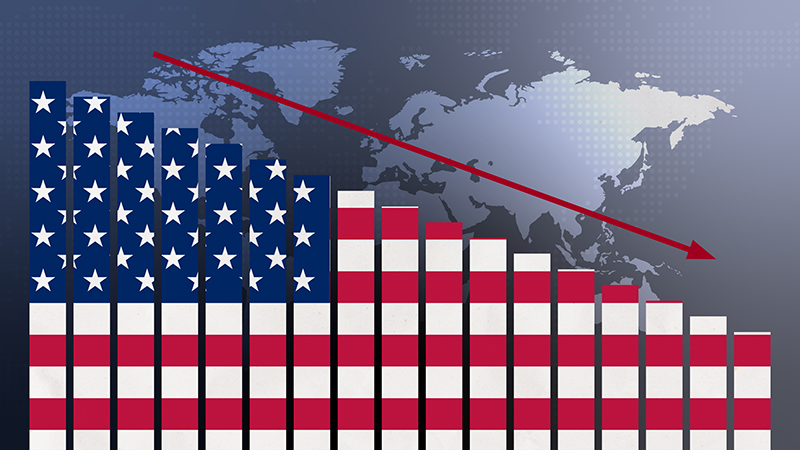Not long back from my first holiday abroad since the pandemic, I was looking out my window longing to be back swimming in the warm Mediterranean ocean off the East coast of Mallorca. I will spare you the details of the travel chaos we experienced both ways – suffice to say it was a lesson learned.
I was expecting 10 days of sun and nothing much else weather-wise, but it did not quite turn out like that, and we were fortunate enough to witness not just one but two thunderstorms. I say ‘fortunate’ because they served as a healthy reminder that it is always calm before the storm.
When it rains in Mallorca it does not just rain, it pours – indeed, not only does it pour, it hails. One minute I was soaking up the sun or swimming in the sea with little care in the world, the next I was running back to the hotel to take cover from giant hail stones. The speed with which the weather turned was breath-taking – though maybe not quite as remarkable as the speed with which inflation has sprung to double digits from close to zero in the UK and other parts of the world.
For the last three decades, inflation had been relatively calm – mostly range-bound between 1% and 3% in both the UK and the US. There had also been little in the way of interest rate volatility for more than a decade. As an example, the Bank of England had kept the UK base rate below 1% since 2009 – yet the latest UK inflation print remains close to double digits (and comfortably in double-digits for those who prefer to reference RPI).
Central bankers now appear to be in competition to see who can raise interest rates the quickest, driving the cost of credit up for borrowers. They and other policymakers would seem to be getting off lightly for their role in one of the worst cost-of-living crises in living memory.
Significant policy errors
We now find ourselves in the eye of an inflationary storm and are all paying the price for significant policy errors that are eroding people’s standard of living at an alarming rate. Russian President Vladimir Putin’s invasion of Ukraine has certainly not helped, but inflation in both the UK and US had already started to take off before any Russian tanks had crossed the Ukrainian border.
The first policy error was the complacency with which central bankers naively believed high inflation had been defeated and was a thing of the past. This complacency was best demonstrated when US Federal Reserve chair Jerome Powell stated as recently as August 2020 that the Fed would relax its inflation target, willingly allowing inflation to temporarily run hot in an attempt to instead target average inflation over a cycle. The move did not receive much coverage at the time but, in one fell swoop, the seeds were sewn for previously well-anchored inflation expectations to start rising.
The second error was a complete lack of foresight and disregard for basic economic principles. It is frustrating to read almost daily quotes from central bankers that suggest they are simply reacting to the latest inflation print or data on economic activity. Any economics student will tell you that monetary policy acts with a significant lag and central bank policy should always be addressing inflation 18 months to two years out from the present day.
There is also a well-known relationship between unemployment and inflation that, on a graph, plots what is called the ‘Phillips Curve’. This shows us that low levels of unemployment lead to higher levels of inflation. Central bankers seem to have ignored this relationship in recent years while governments around the world devised policies to deliberately keep unemployment low during the pandemic.
This barely rose above 5% in the UK and very quickly started to fall at pace in 2021 – a time when the Bank of England was still printing money along with many other central banks around the world. The European Central Bank was even still printing money when inflation was north of 8%! Why? Because of an apparent obsession for policy to be consistent with prior forward guidance.
Stability breeding instability
Forward guidance has become a commonly used monetary policy tool within the last decade. Central banks essentially guide the market as to where interest rates are heading. In theory, it should reduce economic volatility as individuals and businesses can make spending and investment decisions with an idea as to where the cost of finance is trending. The problem, however, is that stability can breed instability, and forward guidance in itself can be counterproductive by dampening the impact of each interest rate decision on asset markets and the economy.
The last two policy errors did not sit with central banks but instead with politicians. Poor energy policy has made the UK and the rest of Europe highly vulnerable to energy shocks. In the case of the UK, an inability to press on with more nuclear power generation and an unwillingness to invest in gas storage facilities has been a grave policy error.
In Europe, meanwhile, the decision by industrial powerhouse Germany to rely so much on Russia to satisfy its energy needs was an even bigger policy error. The antiquated link between gas prices and electricity prices is yet another, given that more than 40% of the UK’s power generation now derives from renewable energy sources at a substantially lower cost of production. Both the UK and the rest of Europe now appear to be waking up to this issue.
Lastly, government policies during the pandemic were driven far too much by health considerations and specifically one isolated healthcare issue. The stress placed on supply chains across the world from overzealous Covid-19-related work restrictions has contributed significantly to today’s runaway inflation.
Sadly, as a consequence of greater poverty, this will likely now lead to considerable ill-health. Added to the increased incidences of cancer from missed screening appointments during the pandemic and greater cases of mental health suffering, it begs the question whether society really benefitted from those heavy-handed policies that restricted economic activity.
Mark Wright is an investment manager at Momentum Global Investment Management











